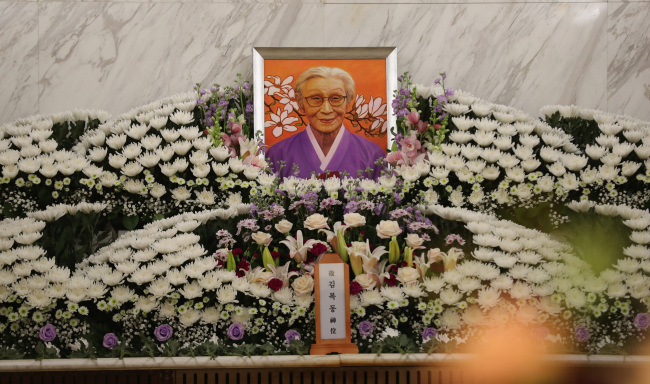Kim Bok-dong, a South Korean victim of sexual slavery by the Japanese military during World War II and a symbol of the fight against wartime violence, died late Monday, bringing the number of survivors to 23. She was 92.
Kim, who was at the forefront of raising awareness about Japanese military sexual slavery and campaigning to end violence against women around the world, died at 10:41 p.m. Monday at Yonsei Severance Hospital in Seoul, according to the Korean Council for Justice and Remembrance. She had battled colorectal cancer for about a year.
In her last moments, she expressed “rage toward Japan” and called for the continued fight to receive an apology from Japan, according to Yoon Mi-hyang, president of the Korean Council, who was by her side when she died.
President Moon Jae-in sent a condolence message, praising Kim for dedicating her life to revealing hidden aspects of history and restoring the dignity of human beings.
“Grandmother (Kim Bok-dong) did not remain a victim, but was at the forefront of setting history straight by demanding an apology and legal compensation for Japan’s aggression,” Moon said on his Facebook page.
“I will not forget to set history right,” he said, vowing to fulfill his duty to the 23 living survivors.
Later in the day, Moon visited the funeral home at Yonsei Severance Hospital, where a memorial altar for the deceased was set up, to pay his respects. He met with Gil Won-ok, 91, one of the surviving victims, there.
 |
Kim Bok-dong`s funeral altar. (Yonhap) |
Born in Yangsan, South Gyeongsang Province, in March 1926, Kim was taken to Japan in 1940 when she was only 14 years old. She was told that she would work in a factory to support Japan’s war effort, but instead she ended up in Japanese military brothels.
Kim was forced to work in front-line brothels in different countries, including China, Malaysia, Indonesia and Singapore, for Japanese troops for eight years during World War II.
It was in 1992 that Kim came forward as a former “comfort woman” -- a euphemism for the women and girls coerced to work in Japan’s front-line brothels -- and publicly testified about her experience as a wartime sex slave.
This was soon after another victim, Kim Hak-sun, first broke the silence on the issue in 1991.
Since the early 1990s, Kim Bok-dong had traveled to the US, Japan and other countries to speak out about her plight.
She was also a regular participant in the Wednesday rallies, which began in 1993 in front of the Japanese Embassy in Seoul, where she and other survivors demanded an apology from Japan and formal reparations for the women it had forced into wartime sexual servitude.
Her role, however, was not limited to raising awareness of Japan’s sex slavery. Kim was at the center of efforts to promote peace and end violence during wartime.
To help victims of sexual violence in armed conflicts around the world, Kim, together with another former comfort woman, Gil Won-ok, established the Butterfly Fund in 2012. In 2014, she apologized on behalf of Korea to Vietnamese women who had been sexually assaulted by Korean soldiers.
Kim was also a generous donor. She donated funds to help people affected by the March 11, 2011 earthquake and subsequent tsunami that devastated Japan’s northeastern coast, and established scholarships worth 50 million won ($44,800) for six ethnic Korean students in Japan.
Kim was only one of many young Asian women systematically recruited and forced to work in Japan’s military brothels. Historians estimate that up to 200,000 women were forced into sexual slavery for Japan before and during World War II. The majority came from the Korean Peninsula, which Japan colonized from 1910-1945.
Kim’s death leaves only 23 survivors. The number of registered survivors in and outside South Korea was 247, according to government data.
To settle the issue, South Korea and Japan signed a deal in 2015 in which Japan apologized to the victims and provided 1 billion yen ($9.15 million) for the Reconciliation and Healing Foundation set up under South Korea’s Gender Ministry to support the victims.
Some of the victims and members of the public, however, protested the deal struck under the Park Geun-hye administration, saying it failed to reflect their demands. They called for the nullification of the deal and the dissolution of the foundation.
Kim was one of many survivors who strongly opposed the deal, demanding a sincere apology from Japan and formal recognition of Japan’s legal responsibility for its war crimes.
The Moon Jae-in administration has concluded that the 2015 deal was seriously flawed and has said it would disband the foundation.
Koreans flock to altar
Ordinary citizens, President Moon and other political bigwigs were seen flocking to the memorial altar for Kim to pay their respects.
Gil Won-ok, Kim’s longtime friend and victim of Japan’s sexual enslavement, also appeared at the funeral home in a wheelchair. On her knees, she quietly looked at Kim’s portrait placed on the shrine for about five minutes and let out a deep sigh.
“She was gone this quickly,” she said.
Gender Minister Jin Sun-mi and high-profile lawmakers from the ruling Democratic Party and minor opposition parties -- Justice Party and Party for Democracy and Peace -- also paid visits.
“When I think about her having died without getting an apology from Japan, I feel resentful,” Oh Mi-hee, 43, told The Korea Herald at the altar.
“I hope she can hear some good news up in heaven as soon as possible,” she said, demanding an apology and formal reparations from Japan.
By Ock Hyun-ju (
laeticia.ock@heraldcorp.com)








